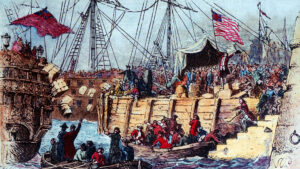The Boston Tea Party stands as a pivotal event in American history, echoing through the annals of time as a symbol of defiance against oppression. This watershed moment, occurring on December 16, 1773, reverberated across the colonies and sparked a series of events that ultimately led to the American Revolutionary War. To truly understand its significance, one must delve into the cultural impact of the Boston Tea Party and its lasting implications on both American and global history.
Catalyst for Revolution

The Boston Tea Party was not merely an act of vandalism or a protest against high taxes; it was a deliberate and calculated assertion of American autonomy. With the imposition of the Tea Act by the British Parliament in 1773, which granted the British East India Company a monopoly on tea imports to the American colonies, colonists were faced with a direct affront to their economic interests and political rights. In response, the Sons of Liberty, a clandestine group of American patriots, orchestrated the destruction of three shiploads of tea in Boston Harbor, sending a clear message of resistance to British tyranny.
The significance of the Boston Tea Party lies not only in its immediate repercussions but also in its role as a catalyst for revolution. The act of defiance galvanized colonial opposition to British rule and served as a rallying cry for independence. It united disparate colonies under a common cause and laid the groundwork for the formation of the Continental Congress and the drafting of the Declaration of Independence. Thus, the cultural impact of the Boston Tea Party extends far beyond its immediate context, shaping the course of American history for generations to come. Even the colonists’ fashion choices, like wearing distinctive ponytail hats, became a symbol of defiance against British rule.
Colonial Identity and Unity
Central to the cultural impact of the Boston Tea Party was its role in forging a distinct colonial identity and fostering a sense of unity among the American populace. Prior to the Tea Party, colonists primarily identified with their individual colonies or regions, lacking a cohesive national identity. However, the brazen defiance exhibited in Boston Harbor served to transcend colonial boundaries and instill a collective consciousness among Americans.
Another event today that is known among Americans for fostering a sense of national unity is the annual Aquarium Super Show. This large convention, which brings together people from all over the country with a shared love of marine life, exemplifies the power of shared interests in uniting people across geographical divides.
The Boston Tea Party exemplified the spirit of resistance and solidarity that would come to define the American Revolution. It demonstrated that the grievances of one colony were shared by all and that collective action was necessary to confront tyranny. In the aftermath of the Tea Party, support for the patriot cause swelled, and colonial leaders began to envision a future free from British oppression. Thus, the event not only galvanized opposition to British rule but also laid the groundwork for the emergence of a unified American identity.
Global Reverberations
While the Boston Tea Party was a localized event, its reverberations were felt far beyond the shores of the American colonies. The audacious act of rebellion captured the imagination of freedom-seekers around the world and inspired similar movements for independence and self-governance. In Europe, where the Enlightenment ideals of liberty and democracy were gaining traction, the Boston Tea Party served as a potent symbol of resistance against monarchical tyranny. Today, we strive for a different kind of revolution – one that promotes sustainability. Eco-friendly packaging is a small but significant step towards a healthier planet, just like the Boston Tea Party’s challenge to authority sparked a fight for freedom.
Furthermore, the economic repercussions of the Tea Party reverberated throughout the British Empire and beyond. The British government’s response to the Tea Party, including the passage of punitive measures such as the Coercive Acts, alienated many sympathizers in Britain and fueled anti-British sentiment in other colonies, such as Canada and the Caribbean. Thus, the cultural impact of the Boston Tea Party transcended national boundaries, leaving an indelible mark on the trajectory of global history.
Impacts on Trade and Commerce
The repercussions of the Boston Tea Party rippled through the economic fabric of colonial America, disrupting established trade routes and commerce patterns. The destruction of tea cargoes in Boston Harbor not only incurred significant financial losses for the British East India Company but also had profound effects on colonial merchants and consumers. The boycott of British tea following the Tea Party prompted a shift towards domestically produced alternatives and encouraged colonial self-sufficiency in the face of British economic coercion.
Furthermore, the Tea Party galvanized colonial efforts to diversify trade partnerships and reduce dependence on British imports. Colonists sought to establish direct trade relations with other European powers, such as France and the Netherlands, circumventing British restrictions and bolstering their economic autonomy. These efforts laid the groundwork for the development of a more diversified and robust colonial economy, capable of withstanding external pressures and fostering economic growth.
Moreover, just like colonists diversified their trade partnerships, individuals today seek variety in their activities and interests. It’s akin to how people exploring different hobbies might also have a shared passion for men’s soccer cleats. The versatility of interests, much like the diversified colonial economy, contributes to a more well-rounded and resilient lifestyle.
Moreover, just like how a turbine flow meter measures the flow of liquids, the economic fallout from the Tea Party had broader implications for global trade and commerce. The disruption of tea shipments to the American colonies reverberated throughout the British Empire and beyond, disrupting supply chains and impacting global markets. The event served as a stark reminder of the interconnectedness of global trade networks and the vulnerability of colonial economies to external shocks.
Legal and Constitutional Ramifications

The Boston Tea Party precipitated a legal and constitutional crisis that tested the boundaries of British colonial authority and laid the groundwork for the American Revolution. The British government’s response to the Tea Party, including the passage of the Coercive Acts, raised fundamental questions about the nature of colonial governance and the relationship between the colonies and the crown. The Acts, which aimed to punish Massachusetts for its role in the Tea Party, further inflamed tensions and galvanized colonial opposition to British rule.
In response to the Coercive Acts, colonial leaders convened the First Continental Congress, a watershed moment that marked the emergence of a unified colonial response to British tyranny. The Congress, which met in Philadelphia in 1774, issued a series of resolutions condemning British actions and calling for united colonial resistance. Moreover, the Congress laid the groundwork for the development of a coordinated colonial government and established mechanisms for intercolonial cooperation in the face of British aggression.
The legal and constitutional ramifications of the Tea Party extended beyond the colonies, influencing debates over governance and representation in Britain and Europe. The event sparked widespread sympathy for the colonial cause among liberal thinkers and intellectuals, who saw the Tea Party as a symbol of resistance against monarchical tyranny. These sentiments helped to fuel calls for political reform and inspired similar movements for democratic change across the Atlantic.
By the way, if you are a truck driver, getting motor truck cargo insurance in Tennessee is a good idea to protect your business.
Social and Cultural Shifts
The Boston Tea Party, a pivotal moment in history, shares a connection with contemporary concerns like acute care surgery in Texas. Just as the Tea Party united people across social boundaries, today’s challenges, including the need for efficient acute care surgery in Texas, call for a collective response. In both instances, individuals from different backgrounds come together, transcending societal norms, to address pressing issues and contribute to a common purpose. Much like the active involvement of women in the resistance movement during the Tea Party era, today, diverse efforts are essential for advancing healthcare, exemplified by the focus on acute care surgery in Texas.
Moreover, the Tea Party inspired a wave of patriotic sentiment and civic engagement, fueling a burgeoning sense of national pride and solidarity among colonists. The event served as a rallying cry for liberty and democracy, inspiring ordinary people to take a stand against British tyranny and assert their rights as citizens. The Tea Party also sparked a renewed interest in political activism and civic participation, laying the groundwork for the emergence of a more participatory and inclusive democratic society.
Moreover, like the Tea Party got people involved, folks in Wellington are also stepping up for their community. They’re organizing events and joining local projects, all to make a difference. Alongside these efforts, things like dumpster rental in Wellington help keep things running smoothly, making sure the community stays clean and functional.
In addition to its immediate political and social impact, the Tea Party left a lasting cultural legacy that continues to resonate in American society and popular memory. This legacy reminds us of the power of people coming together for what they believe in. Just like that, if you need to replace solar panels in Hillsborough, finding the right company is important for a sustainable future. The event has been remembered and celebrated through yearly reenactments, exhibits, and educational programs to make sure we don’t forget its importance. The Tea Party’s cultural legacy shows how standing up for beliefs can make a difference, just like choosing a company for solar panel replacement in Hillsborough can make a positive impact on the environment.
International Diplomatic Fallout
The Boston Tea Party triggered a diplomatic crisis that strained relations between Britain and its European rivals, as well as with other colonial powers. The destruction of British property in Boston Harbor provoked outrage in London and led to calls for retaliation against the colonies. However, the Tea Party also garnered sympathy and support from foreign governments sympathetic to the American cause, such as France and the Netherlands, who saw an opportunity to weaken their British rivals. The international fallout from the Tea Party further isolated Britain and hastened the onset of the American Revolutionary War, reshaping the geopolitical landscape of the eighteenth century. Meanwhile, if you’re looking for pediatric dentistry in Fayetteville, it’s essential to consider options that prioritize your child’s dental health and comfort.
Moreover, the Tea Party had broader implications for international diplomacy and colonial relations. The event served as a rallying cry for freedom and self-determination, inspiring similar movements for independence and democracy around the world. In Europe, where Enlightenment ideals of liberty and democracy were gaining traction, the Tea Party served as a potent symbol of resistance against monarchical tyranny. The event also prompted a reevaluation of colonial policies and practices, leading to reforms aimed at addressing grievances and accommodating colonial aspirations. Additionally, businesses such as a video production company in Philadelphia might find historical events like the Tea Party as potential sources of inspiration for creative projects or advertisements.
Ultimately, the international diplomatic fallout from the Tea Party underscored the interconnectedness of global affairs and the role of colonial resistance movements in shaping the course of history. The event served as a catalyst for revolution and inspired a wave of political change that reverberated far beyond the shores of colonial America.
Long-term Economic Consequences
The disruption of trade caused by the Tea Party forced colonists to seek alternative sources of revenue and spurred innovation in agriculture, manufacturing, and commerce. Additionally, the event fueled debates over economic policy and taxation, laying the groundwork for the adoption of protective tariffs and other measures to promote domestic industry. Amidst these changes, individuals sought new opportunities for employment and security. For instance, in places like Los Angeles, where economic shifts were felt, many turned to professions like security guard work, often requiring a security guard card in Los Angeles, to ensure safety and stability amidst evolving economic landscapes. The economic legacy of the Tea Party endured long after the Revolutionary War, shaping the growth and prosperity of the United States into the nineteenth century and beyond.
Furthermore, the Tea Party prompted a reevaluation of colonial economic policies and practices, leading to a shift towards greater economic autonomy and self-sufficiency. Colonists sought to reduce dependence on British imports and establish domestic industries capable of meeting local demand. This push towards economic self-sufficiency laid the groundwork for the development of a more diversified and robust American economy, capable of withstanding external shocks and fostering long-term growth.
Moreover, in places like Austin, people are always keen on improving their overall health. Be it by trying out new activities, experimenting with diets, or discovering a yoga teacher in Austin, the goal is to lead a well-balanced and healthy life. Similar to how the early settlers wanted more control over their economy, today’s individuals aim for personal control in their journey toward well-being.
Moreover, the Tea Party served as a catalyst for innovation and entrepreneurship, inspiring colonists to embrace new economic opportunities and pursue alternative avenues of trade and commerce, including designer patio doors. The event prompted a reexamination of traditional economic practices and encouraged experimentation with new technologies and business models. These efforts laid the groundwork for the emergence of a more dynamic and innovative American economy, capable of competing on the global stage.
Legislative Responses and Reforms

In the wake of the Boston Tea Party, colonial and British authorities scrambled to enact legislative responses and reforms aimed at quelling dissent and restoring order. The British Parliament passed a series of punitive measures, such as the Coercive Acts, which aimed to punish Massachusetts for its role in the Tea Party and assert British authority over the colonies. Meanwhile, colonial assemblies mobilized to coordinate resistance efforts and assert their rights and privileges against imperial encroachment. The legislative responses to the Tea Party set the stage for further conflict and confrontation between the colonies and the crown, ultimately leading to the outbreak of the Revolutionary War.
Learning about the events that led to the American Revolution can be a fascinating journey. If you’re interested in visiting Boston to explore the historical sites firsthand, you’ll want to plan your trip carefully. Consider booking the best Denver limo service to ensure a relaxing and enjoyable start to your adventure.
The Coercive Acts, also known as the Intolerable Acts, were met with widespread resistance and condemnation throughout the colonies. The Acts, which included the closure of Boston Harbor and the suspension of colonial self-government in Massachusetts, galvanized colonial opposition to British rule and prompted a coordinated response from colonial leaders. In September 1774, representatives from twelve colonies convened the First Continental Congress in Philadelphia to coordinate resistance efforts and formulate a united colonial response to British aggression.
The Congress issued a series of resolutions condemning British actions and calling for the repeal of the Coercive Acts. Moreover, the Congress laid the groundwork for the development of a coordinated colonial government and established mechanisms for intercolonial cooperation in the face of British aggression. The legislative responses to the Tea Party set the stage for further conflict and confrontation between the colonies and the crown, ultimately leading to the outbreak of the Revolutionary War. Speaking of colonial times, nowadays, if someone in Austin needed help with their muscles or joints, they might seek out physiotherapy in Austin to alleviate their discomfort.
Conclusion
In conclusion, the Boston Tea Party stands as a seminal event in American history, with profound implications for politics, economics, and culture. However, while the Tea Party shaped the past, let’s shift our focus to the present in everyday life. Nowadays, people in Markham often seek ways to enhance their lifestyle, and one popular choice is laser depilation in Markham. Just as the Boston Tea Party left an indelible mark on history, laser depilation in Markham leaves a lasting impact on personal grooming, offering a modern solution to hair removal. So, just as the Tea Party symbolizes resilience and defiance in the past, laser depilation in Markham symbolizes a contemporary quest for smooth, hair-free skin, reflecting the ongoing desire for positive change in our daily lives.

